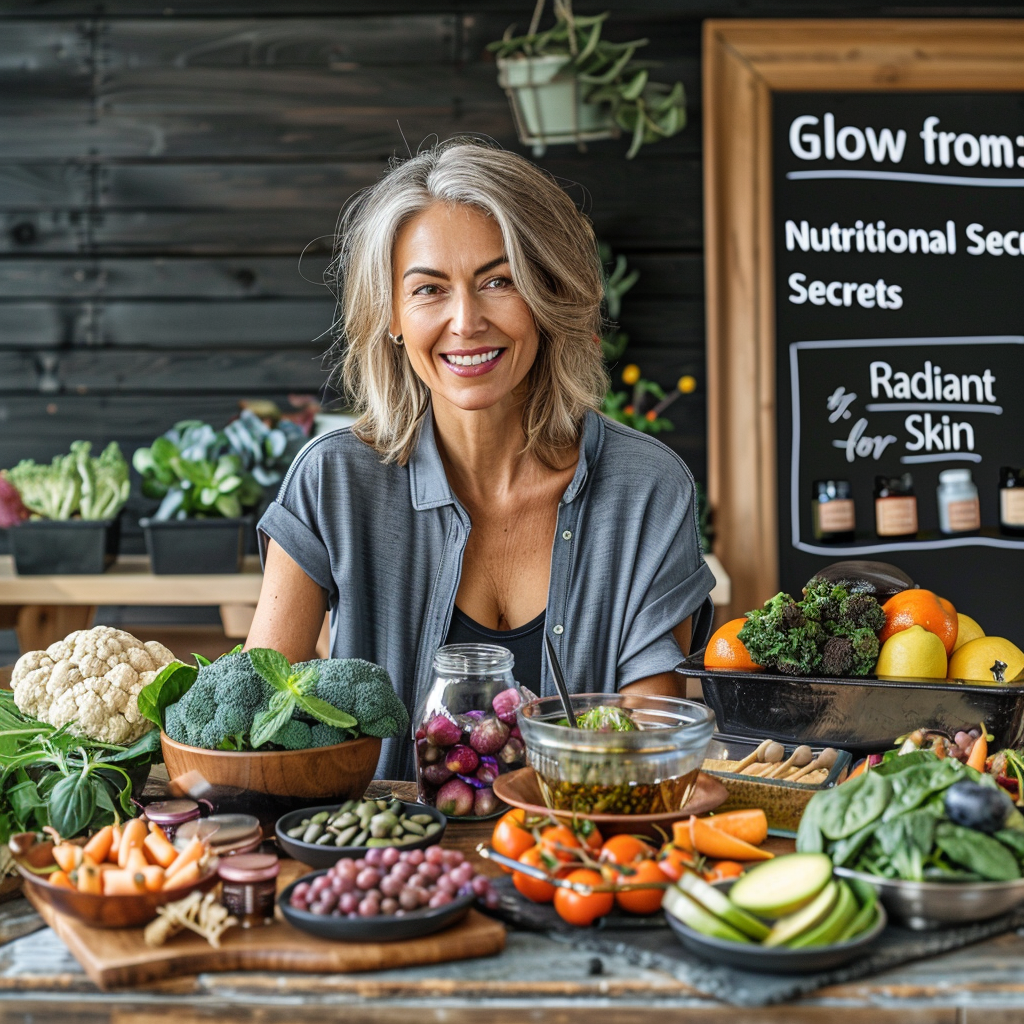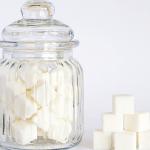Introduction
The importance of nutrition for skin health
Nutrition plays a pivotal role in maintaining the health and vitality of our skin. Often referred to as the body’s largest organ, the skin requires a diverse range of nutrients to repair itself, fight against environmental stressors, and maintain its natural glow. A diet lacking in essential vitamins, minerals, and hydration can lead to a host of skin problems, including dryness, wrinkles, and a lackluster complexion. Conversely, a balanced diet rich in nutrient-dense foods can promote skin that is not only healthy but also radiates from within.
Understanding the skin’s nutritional needs
The skin’s nutritional demands are complex and multifaceted. It requires a steady supply of vitamins such as A, C, E, and D for repair and protection against oxidative damage. Minerals like zinc and selenium play a crucial role in skin integrity and healing. Fatty acids, particularly omega-3 and omega-6, are essential for maintaining the skin’s lipid barrier, which keeps it hydrated and resilient. Additionally, antioxidants combat free radicals that can lead to premature aging, while probiotics support gut health, which is closely linked to skin clarity.
Overview of the article’s purpose and insights
This article aims to illuminate the “nutritional secrets” for achieving radiant skin from the inside out. We will delve into the skin-nutrition connection, highlighting how diet and lifestyle choices can significantly impact skin health. By understanding the essential nutrients that our skin craves, and the foods that are rich in these nutrients, we can make informed choices that enhance our skin’s natural beauty. Furthermore, we will explore how dietary patterns, lifestyle habits, and the avoidance of harmful chemicals in skincare products can synergistically contribute to a glowing complexion. Our holistic approach will empower readers to nourish their skin through mindful nutrition and self-care practices, leading to lasting radiance and well-being.
The Skin-Nutrition Connection
How Nutrition Affects Skin Appearance
The adage “you are what you eat” is particularly true when it comes to skin health. The nutrients we consume play a significant role in the appearance and vitality of our skin. A diet rich in vitamins, minerals, and antioxidants can help to combat signs of aging, reduce inflammation, and promote a healthy, radiant complexion. Conversely, a diet lacking in these essential nutrients can lead to dullness, dryness, and an increase in visible signs of aging.
Key Nutrients for Skin Health
To maintain and improve skin health, certain nutrients are indispensable:
- Vitamins A, C, E, and D: These vitamins are crucial for skin repair, collagen synthesis, and protection against environmental damage.
- Minerals like Zinc and Selenium: These minerals aid in skin repair and protect against cellular damage.
- Omega-3 and Omega-6 Fatty Acids: Essential for maintaining the skin’s natural barrier, these fatty acids help to keep the skin hydrated and supple.
- Antioxidants: They neutralize free radicals, reducing oxidative stress and inflammation, which can otherwise accelerate the aging process.
The Role of Hydration in Skin Radiance
Hydration is a cornerstone of skin health. Water is essential for maintaining skin elasticity and assisting in the detoxification process. Adequate hydration can help to ensure that the skin remains plump, reducing the appearance of fine lines and wrinkles, and can aid in maintaining a clear, vibrant complexion.
Nutrient Absorption and Skin Health
It’s not just about the nutrients you consume, but also how effectively your body can absorb and utilize them. A healthy gut microbiome is essential for optimal nutrient absorption. Probiotics and a balanced diet can support gut health, which in turn can enhance your skin’s ability to benefit from the nutrients in your diet. Additionally, factors such as age, genetics, and lifestyle choices can affect nutrient absorption, so it’s important to consider these when tailoring your nutritional intake for skin health.
In conclusion, the connection between nutrition and skin health is undeniable. By focusing on a diet rich in key nutrients, staying well-hydrated, and ensuring proper nutrient absorption, you can support your skin’s health from the inside out, leading to a naturally radiant complexion.
By the way, something for you, a little gift!!!
I am just in the middle of publishing my book. It’s about How women can balance their hormones. One part is about food and diet, of course.
Follow this link and enter your email.
I will send you this part of the book for free once the book is published. It has many concrete, practical tips and recipes and will help you feel better during menopause or times of Big hormonal fluctuations.
Annette, Damiva Lead for Health & Wellness

Essential Nutrients for Radiant Skin
Vitamins: A, C, E, and D
The quest for radiant skin begins with a palette of essential vitamins. Vitamin A, found in foods like sweet potatoes and carrots, is critical for skin cell regeneration and repair. Vitamin C, abundant in citrus fruits and leafy greens, is a powerhouse antioxidant that aids in collagen production, helping to keep the skin firm and youthful. Vitamin E, present in nuts and seeds, offers protection against oxidative stress and UV damage. Lastly, Vitamin D, synthesized by the skin upon sunlight exposure and found in fortified foods, supports skin cell growth and repair.
Minerals: Zinc, Selenium, and Silica
Minerals are the unsung heroes of skin health. Zinc plays a pivotal role in inflammation reduction and cell regeneration. It can be sourced from pumpkin seeds and legumes. Selenium, a component of antioxidant enzymes, is found in whole grains and seafood and helps protect the skin from environmental damage. Silica, though less commonly discussed, is vital for the formation of collagen and can be found in foods like cucumbers and leafy greens.
Fatty Acids: Omega-3 and Omega-6
Essential fatty acids are the building blocks of healthy skin. Omega-3 fatty acids, found in fatty fish and flaxseeds, maintain the skin’s moisture barrier and reduce inflammation. Omega-6 fatty acids, present in evening primrose oil and sunflower seeds, are crucial for skin repair and maintaining structural integrity. A balance of these fats is essential for a glowing complexion.
Antioxidants and their role in skin care
Antioxidants are the guardians of skin health, neutralizing free radicals that can lead to premature aging. Foods rich in antioxidants, such as berries, green tea, and dark chocolate, provide a defense mechanism against environmental stressors and aid in maintaining the skin’s natural radiance.
Probiotics and gut health for skin clarity
The gut-skin axis is a testament to the impact of internal wellness on external beauty. Probiotics, found in fermented foods like yogurt and kefir, support a healthy gut microbiome, which in turn can lead to clearer, more vibrant skin. A balanced gut flora is associated with reduced inflammation and may help alleviate skin conditions such as acne and eczema.
Incorporating these essential nutrients into your diet can lead to visible improvements in skin health and radiance. Remember, the path to glowing skin is not just about what you put on your body, but also what you put in it.

Do you have the most commonly used but toxic, disease bringing chemicals in your skin care? Many chemicals in skincare are hormone disruptors and make menopause symptoms worse.
Find out more…
Nutrient-Rich Foods for a Glowing Complexion
Fruits and Vegetables that Promote Skin Health
The adage “you are what you eat” holds particularly true when it comes to skin health. A diet rich in fruits and vegetables is essential for maintaining a vibrant complexion. These plant foods are high in vitamins, minerals, and antioxidants that help protect the skin from damage and support its natural repair mechanisms. For instance, berries are packed with antioxidants that fight free radicals, while leafy greens like spinach provide iron and folate, which are crucial for skin renewal. Citrus fruits, rich in vitamin C, are not only immune boosters but also enhance collagen production, giving skin its elasticity and firmness.
The Benefits of Nuts and Seeds for the Skin
Nuts and seeds are another group of foods that can enhance skin health. They are excellent sources of vitamin E, an antioxidant that protects the skin from oxidative stress and UV damage. Almonds, for example, are not only high in vitamin E but also contain essential fatty acids that help maintain the skin’s moisture barrier. Similarly, flaxseeds and chia seeds are rich in Omega-3 fatty acids, which are known to reduce inflammation and the occurrence of acne.
Healthy Fats and Oils for Skin Elasticity
Healthy fats play a crucial role in keeping the skin hydrated, plump, and youthful. Foods such as avocados, olive oil, and fatty fish like salmon provide monounsaturated and polyunsaturated fats that support skin elasticity. These fats are not only essential for maintaining the skin’s oil barrier but also help in the absorption of fat-soluble vitamins like A, D, E, and K, which are vital for skin health.
Protein Sources for Skin Repair and Regeneration
Protein is the foundation of skin repair and regeneration. It’s the building block of collagen and elastin, the proteins that keep skin firm and elastic. Lean protein sources such as chicken, fish, tofu, and legumes provide the amino acids necessary for the production of these structural proteins. Including a variety of protein sources in your diet ensures that your skin has all it needs to repair itself and stay resilient against the signs of aging.
By incorporating these nutrient-rich foods into your diet, you can support your skin’s health from the inside out. Remember, a balanced diet filled with colorful fruits and vegetables, nuts and seeds, healthy fats, and lean proteins is not just good for your body but also essential for a glowing, radiant complexion.

Feeling You Have a Right to Safe Beauty & Fem Care?
If so, it may be time for a change. It starts with knowledge. We have a few suggestions in our new guides.
Dietary Patterns for Optimal Skin Health
Whole Foods and Plant-Based Diets
Embracing a diet rich in whole foods is a cornerstone for maintaining radiant skin. Whole foods, such as fruits, vegetables, legumes, nuts, seeds, and whole grains, are packed with essential nutrients that nourish the skin. A plant-based diet, in particular, emphasizes these nutrient-dense foods and is associated with higher intakes of vitamins, minerals, and antioxidants. These compounds help protect the skin from oxidative stress and inflammation, which can lead to premature aging and a lackluster complexion.
The Impact of Sugar and Processed Foods on the Skin
Conversely, diets high in sugar and processed foods can have a detrimental effect on skin health. These foods can trigger inflammatory responses and exacerbate conditions such as acne and eczema. High sugar intake can also lead to glycation, a process where sugar molecules attach to proteins like collagen, weakening them and leading to wrinkles and sagging skin. Reducing consumption of these foods can help maintain the integrity of the skin and promote a more youthful appearance.
Balancing the Diet for Skin Health
A balanced diet is key to achieving and maintaining healthy skin. This means ensuring a proper intake of macronutrients (proteins, fats, and carbohydrates) and micronutrients (vitamins and minerals). It’s important to include a variety of foods to cover all nutritional bases. For instance, colorful fruits and vegetables provide a wide array of antioxidants, while lean proteins support the repair and regeneration of skin cells.
Hydration and Its Effects on Skin Vitality
Hydration plays a pivotal role in skin health. Water is essential for maintaining skin moisture and delivering nutrients to the skin cells. It helps to plump up the skin, reducing the appearance of fine lines and wrinkles, and promotes a healthy, vibrant complexion. Aim to drink at least 8 glasses of water a day, and include water-rich foods like cucumbers, oranges, and watermelon in your diet to help keep your skin hydrated from the inside out.
In conclusion, a diet centered around whole foods, with limited sugar and processed foods, balanced macronutrient intake, and adequate hydration, can significantly contribute to the health and radiance of your skin. By making mindful dietary choices, you can glow from within and enjoy the benefits of a clear, vibrant complexion.

Bette 100% All-Natural Relaxing Lavender Body Lotion.
Chemical-Free
Your relaxing night time body moisturizer to leave the day’s stress behind. Decompress and wish your body good night with the calming scent of lavender.
Lifestyle and Nutritional Synergy
The Interplay Between Diet, Sleep, and Stress
Nutrition, sleep, and stress form a triad that significantly impacts skin health. A balanced diet rich in essential nutrients can promote skin repair and regeneration, while inadequate sleep can lead to a dull complexion and the appearance of fine lines. Stress triggers the release of cortisol, a hormone that can exacerbate skin conditions such as acne and eczema. Managing these three aspects holistically can lead to a radiant glow. Prioritizing sleep hygiene, consuming a nutrient-dense diet, and employing stress-reduction techniques like meditation or yoga can create a positive feedback loop for skin health.
Exercise and Its Benefits for Skin Health
Regular physical activity increases blood flow, nourishing skin cells and carrying away waste products, including free radicals. Exercise also helps reduce stress, which can decrease the occurrence of stress-related skin issues. Moreover, sweating during a workout can help clear out pores, although it’s essential to cleanse the skin post-exercise to prevent any potential clogging. Incorporating a mix of cardiovascular, strength, and flexibility exercises can optimize skin health, contributing to a natural, healthy glow.
Sun Exposure and Skin Nutrition
While moderate sun exposure is necessary for vitamin D synthesis, which plays a role in skin health, too much sun can damage the skin, leading to premature aging and increasing the risk of skin cancer. It’s crucial to balance sun exposure with protection. Use broad-spectrum sunscreen, wear protective clothing, and seek shade during peak UV hours. Foods rich in antioxidants can provide an internal layer of protection against UV damage, so include plenty of fruits and vegetables in your diet.
Avoiding Harmful Chemicals in Skincare Products
The skin absorbs a significant portion of what we apply to it, making it imperative to choose skincare products wisely. Opt for products with natural ingredients and avoid those with harsh chemicals that can strip the skin of its natural oils and disrupt the skin barrier. Ingredients like parabens, phthalates, and synthetic fragrances can be harmful over time. Instead, look for products with nourishing components such as jojoba oil, which mimics the skin’s natural sebum, and antioxidants like vitamin E for soothing hydration.
By embracing a lifestyle that synergizes nutrition, sleep, stress management, exercise, sun protection, and mindful skincare product selection, you can enhance your skin’s natural radiance from within. This holistic approach not only benefits your skin but also contributes to overall well-being.
Conclusion
Summary of Nutritional Secrets for Radiant Skin
The quest for radiant skin is an inside job, and nutrition plays a pivotal role. Throughout this article, we’ve uncovered the nutritional building blocks that contribute to a glowing complexion. Vitamins A, C, E, and D, along with minerals like zinc, selenium, and silica, form the foundation of skin health. Fatty acids, particularly omega-3 and omega-6, are essential for maintaining skin elasticity and integrity. Antioxidants combat oxidative stress, while probiotics support a balanced gut microbiome, reflecting positively on skin clarity.
Empowering Choices for Skin Care and Nutrition
Making empowered choices about what we put into our bodies is as important as the skincare products we apply. Nutrient-rich foods like fruits, vegetables, nuts, seeds, and healthy fats are not just fuel for our bodies; they’re the raw materials for our skin cells. By choosing whole foods over processed options and sugar, we can significantly influence our skin’s health and appearance. Hydration, too, cannot be overstressed, as it plumps up skin cells and aids in detoxification.
Encouragement for a Holistic Approach to Beauty and Health
True beauty is the reflection of overall well-being, and it requires a holistic approach. Diet and nutrition are undoubtedly crucial, but they are part of a larger picture that includes lifestyle factors such as sleep, stress management, and exercise. Sun protection and the avoidance of harmful chemicals in skincare products also play a significant role in maintaining skin health. By embracing this comprehensive approach, we can not only enhance our skin’s radiance but also improve our overall health.
In conclusion, glowing skin is a testament to our lifestyle choices, and nutrition is at the heart of it. By understanding and applying the principles discussed in this article, we can all enjoy the benefits of a radiant complexion. Let’s make choices that nourish our skin, empower our self-care practices, and encourage a life of holistic health. Here’s to glowing from within!

















